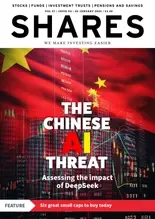
The equity market tone improved substantially on Wednesday, with the risk of a global banking crisis seeming to recede and a rally in Chinese technology stocks providing an additional boost.
In London, insurance and banking stocks, as well as a share price recovery for grocer Ocado, bolstered the FTSE 100. Next suffered a share price decline, however, as investors were disappointed the retailer failed to raise guidance.
The FTSE 100 index rose 58.43 points, 0.7%, at 7,542.68 midday Wednesday. The FTSE 250 was up 143.64 points, 0.8%, at 18,540.33. The AIM All-Share traded 2.59 points higher, 0.3%, at 795.04.
The Cboe UK 100 was up 0.7% at 753.92, the Cboe UK 250 added 0.9% at 16,137.78, and the Cboe Small Companies was up 0.6% at 13,280.01.
In European equities on Wednesday, the CAC 40 in Paris surged 1.2%, while the DAX 40 in Frankfurt was up 0.7%.
‘Stock indices rose in Europe on [Wednesday], enough to pare yesterday’s losses after bullish enthusiasm towards Chinese tech shares strengthened market sentiment everywhere ahead of key macro data this week,’ ActivTrades analyst Pierre Veyret commented.
Focus later this week will be on a US gross domestic product reading on Thursday and a eurozone inflation estimate on Friday.
A strong share price advance for Alibaba set the tone earlier on Wednesday. Shares had closed up 12% in Hong Kong on well-received break-up plans.
Alibaba on Tuesday said it will split its company into six business groups, each with the ability to raise outside funding and go public, the most significant reorganization in the Chinese e-commerce firm’s history.
JD.com and Baidu, meanwhile, each rose 1.9% in a strong day for Chinese technology shares.
The good feeling continued during the European open. Shares in New York were set for a positive start.
The Dow Jones Industrial Average was called to open 0.7% higher, the S&P 500 up 0.9% and the Nasdaq Composite 0.8% higher.
‘Regardless if it is far too early to have a confident view of the implications of the current banking turmoil for the US economy, nothing matters regarding stocks. After shifting from recession worries in January to sticky inflation fears in February and another sharp pivot contending with banking stress and credit crunch fears in March, the beat goes on as far as stocks are concerned,’ SPI Asset Management analyst Stephen Innes commented.
The UK’s major banks are ‘resilient’ in the face of global turmoil, but households and business still face the risk of higher borrowing costs as a result, according to the Bank of England.
In its latest Financial Policy Summary, the central bank said that UK households remain ‘squeezed’ by higher living costs and mortgage payments. However, it said more households are expected to be well positioned to pay off debts than was expected in December 2022 due to cooling energy prices and an improved UK employment outlook.
The pound was quoted at $1.2342 on Wednesday afternoon UK time, unchanged from $1.2339 at the London equities close on Tuesday. The euro traded at $1.0854, up from $1.0839. Against the yen, the dollar climbed to JP¥131.84 from JP¥130.98.
In Zurich, UBS shares rose 1.6%. It turned to its former chief executive officer, following its takeover of Credit Suisse. Sergio Ermotti, currently chair of reinsurer Swiss Re, will retake the helm of the Swiss bank next month.
Ermotti was previously CEO of UBS from late 2011 to October 2020, during which time he ‘successfully repositioned UBS following the severe challenges arising from the global financial crisis’, the bank asserted.
Incumbent UBS CEO Ralph Hamers has ‘agreed to step down to serve the interests of the new combination, the Swiss financial sector and the country’, UBS said.
Credit Suisse shares were 1.3% higher. Swiss Re was up 0.6%.
Banking stocks in London also were on the up after recent losses. Barclays rose by 1.9%, HSBC by 1.5% and NatWest by 1.0%, with markets more at ease after a fortnight of turmoil in the banking sector.
Insurance stocks, which also have been under selling pressure of late, were higher as well. Asia-focused Prudential climbed 3.5%, while Hiscox rose 1.5%.
Ocado was the best large-cap performer, surging 5.2%. The online grocer and warehouse technology provider suffered a 1.8% share price fall on Tuesday on a poorly-received trading statement from joint venture Ocado Retail.
Clothing and homewares retailer Next was the worst FTSE 100 performer. It failed to raise cautious annual guidance, disappointing the market. Its shares went into the London afternoon 5.9% lower.
Next still expects full price sales to decline 1.5% in the year to January 2024. Pretax profit is to decline 8.5% to £795 million.
For the year just gone, pretax profit edged up 5.7% to £869.3 million from £823.1 million. This topped Next’s guidance of £860 million.
Elsewhere in London, RM surged 8.6%.
The technology and resources supplier to the education sector said it is in a ‘much more stable financial and operational position’.
For the year ended November 30, RM reported revenue of £214.2 million, up 3.9% from £206.1 million. However, it swung to a pretax loss of £20.8 million from profit of £3.6 million. Operating expenses increased 35% to £63.6 million.
RM did not declare a dividend for the financial year, compared to a 4.7 pence payout in financial 2021.
‘RM’s performance in FY2022 was materially impacted by the challenges associated with the IT implementation project in our Consortium business. These challenges led to us having to take a number of actions, including suspending the payment of dividends. I recognise that there is much to be done to rebuild value for our stakeholders, but I’m pleased to report that we now have a much more stable financial and operational position, including a renewed banking facility which will run until July 2025,’ Chief Executive Mark Cook said.
Gold was quoted at $1,967.63 an ounce early Wednesday afternoon, edging up from $1,967.14 on Tuesday. Brent oil was trading at $78.78 a barrel, up slightly from $78.09
Copyright 2023 Alliance News Ltd. All Rights Reserved.




